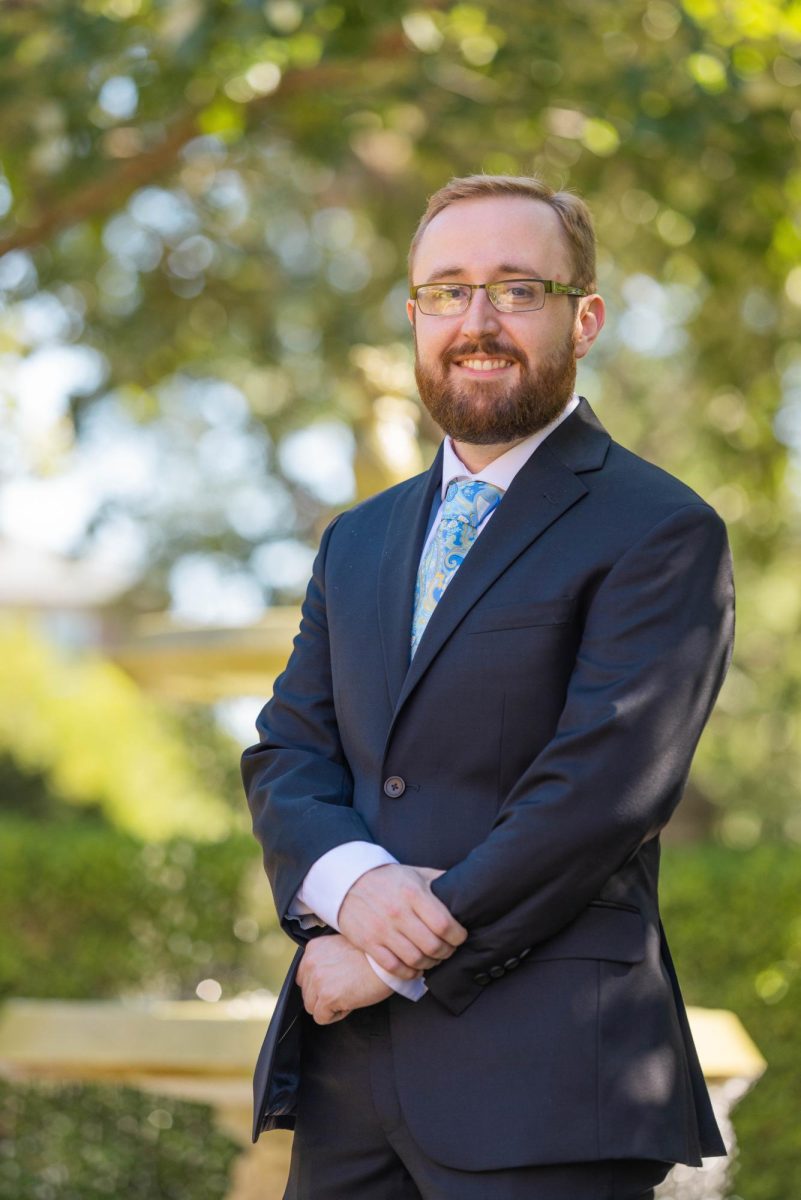Last updated on Feb. 15, 2024 at 10:39 a.m.
Thomas Clatterbuck, a third-year student in the College of Law, is currently running for the Republican nomination of the 13th Congressional District of Illinois. He faces fellow Republican Joshua Lloyd in the primary on March 19. The winner of the primary will face incumbent Democrat Nikki Budzinski in the election this November.
Before attending law school at the University, Clatterbuck, a Central Illinois native, received his bachelor’s degree in history from the University of Illinois at Springfield. He helped start a watchdog media company during his time in Springfield, Illinois, and worked in the Sangamon County Circuit Clerk’s office to help people without lawyers. He will graduate with his law degree this spring.
The Daily Illini sat down with Clatterbuck to discuss his campaign.
Get The Daily Illini in your inbox!
This interview has been edited for length and clarity.
The Daily Illini: Could you introduce yourself and give some information about your background?
Clatterbuck: I am a student at the University in my third year at the College of Law, so I’m on track to graduate in it. Before I was a law student and obviously running for office, I worked in Springfield — I did independent journalism and I worked at the local courthouse. (My) B.A. is in history from the University of Illinois, but the Springfield campus.
DI: Could you provide a brief overview of your platform and why you decided to run for office?
Clatterbuck: So, my platform is based on the idea that there are two sets of issues in the government today. There are the hot-button issues — the big issues everybody’s heard about — and then there’s a bunch of good government … issues that really matter to the functioning of the country, the functioning of the government.
Everybody likes to talk about hot-button issues because they’re fun, they’re exciting. Everybody knows about them. But my perspective is one more vote in either party doesn’t really move the needle, but there are a bunch of issues — particularly when it comes to emerging technology when it comes to improving government services in the nuts and bolts of government — where one dedicated activist can make a difference.
My platform (talks) about looking at emerging technologies, looking to improve the tax code and improving social security. Those are issues that I want to focus on, not because they’re necessarily more important than issues like immigration, but because one person really sinking their teeth into it can move the needle. I don’t want to just posture. I don’t want to just “talk the talk.” I want to make sure that I’m focusing on things that I can actually do to make things better for the people in my district and the people in this country.
DI: On your platform (you discuss) biometric scanning, self-driving cars and concerns with the sector of emerging technology. You also ran a tech/media startup when you were in Springfield. How did your experience lead you to kind of choose this platform?
Clatterbuck: The main thing with the media company is … a lot of the important business of the government doesn’t make it into the news, especially when it comes to local government. There’s the big headline stuff, but city council meetings or long meetings … There’s really serious business being done at the state House every day that doesn’t necessarily hit the news cycle.
One of the more interesting stories I ran into in the state House was where there was a new disease that affected children and doctors knew about it. But even though doctors had treatments for it, they couldn’t bill for them because there were no insurance codes. That sounds ridiculous, like, what do you mean we don’t have a code to bill for this? … There was no way for the government to let doctors do their jobs.
That really opened my eyes. We have to focus not just the stuff that’s in front of your face. You have to focus on the nuts and bolts of how these things mechanically happen. When I was in the business world, there were things that I saw dealing with government bureaucracy up close, where there isn’t any sense for these functions to be happening the way they’re happening. … It really makes a difference in how businesses are able to operate, how companies are able to operate. In short, the legal landscape is facilitating the things we want it to be facilitated in a way that it’s frequently not right.
DI: How have you been campaigning and connecting to voters, especially ones at the University?
Clatterbuck: I’m trying to be engaged with the community, particularly with the conservative clubs on campus. (When) campaigning on campus, there’s some difficulties because there are restrictions about campaigning on state property. There are rules and norms and you have to respect those. You have to walk that line. But a lot of it is not even formal campaigning; it’s just talking with people at lunch, seeing the student organizations. What are they talking about? Who’s putting up fliers? Who’s engaged in what? … You don’t have to give a speech to find out what people care about. You just have to walk on the quad and read the message board to see what people are talking about.
Out in the wider world is a little bit easier, because in such a big district, you have a lot of party infrastructure. A lot of people are having events; a lot of people are doing things out in the wild, as it were. I’ve been going to a lot of events all across the district, trying to meet people directly at these events, because in this phase of the election, the primary is really about your core voters. They’re going to vote in March … You have to connect with the party leaders to get the party leaders to say, “OK, this is somebody we feel confident with going forward to November.”
DI: If elected, what would your policy be toward topics such as gun legislation, or gun regulation, and abortion?
In Dobbs v. Jackson Women’s Health Organization (2022), the Supreme Court overturned Roe v. Wade (1973), allowing abortion rights to be determined by states.
The Hyde Amendment prevents federal funds from being used to pay for an abortion unless deemed a medical necessity.
Clatterbuck: (To) start with the abortion question, I don’t think it’s a secret that I’m pro-life. (I’m) running a Republican race. But I also believe in our constitutional system, and I believe in respecting the laws that we have. Even though personally I would like there to be less abortion, I would not support a federal abortion ban because I don’t think it’s constitutional. I don’t think even the Supreme Court that gave us Dodds would support a federal abortion ban. So I wouldn’t vote for it because I don’t think it would survive.
I think the funding status quo that we have with things like the Hyde Amendment represent a culturally acceptable status quo. The main takeaway from Dodds isn’t a substantive change in the law; it’s a question of who gets to make the decisions the states are making. So that’s where the ball is — I don’t think there’s any really effective or appropriate action to be taken at the federal level.
When it comes to guns, the principal problem we have in this country when it comes to gun violence are what they call deaths of despair. We have people who are killing themselves, and people who are lashing out because they’re engaged in the drug world, they’re mixed up in criminal activity as a result of the economic conditions that we have (and) the cultural conditions that we have. I think … to say, “Oh, are we going to regulate guns?” There’s 400 million guns in this country. With 3D printing, that number is only going to go up. The idea (of) dealing with gun violence on the gun side of the question, I think, is really the wrong approach.
We need to look at how we get the drug problem under control. How do we get people more engaged with their communities so they’re not feeling those self-destructive tendencies and antisocial tendencies that do lead to violence? And so I think we need to ask (what the) question of gun violence is sort of missing. We need to deal with the mental health crisis in the country and the social crisis in this country if we’re going to get the violence problem in this country under control.
DI: If you’re elected, you’d be running against incumbent Nikki Budzinski in the election. Why do you think you’re the right candidate to face her?
Clatterbuck: Being a congressperson gives you one of the most powerful platforms in the country or even the world to affect policy. It really lets you say, “Here are the things that I care about, here are the ways that I’m going to use the opportunity that I’ve been given to make things better.” My platform isn’t boilerplate, I don’t think anybody would question that. But it’s full of things that matter to the people in my district, and that matter to me … They’re issues that I think I can move the needle on.
If I was going to have a criticism of Nikki Budzinski’s first term, it’s that lack of personal voice, that personal opportunity she’s been given by the voters and by the party on an incredible opportunity. And I don’t think she’s taking full advantage of it. The reason I’m running is — I know the power a congressperson has to make the country better. I wanted to have the opportunity to use that platform, both during the race and during the term, to do everything that I can to move the needle on these issues that matter to so many people. I’ve just not seen that same passion from her.







